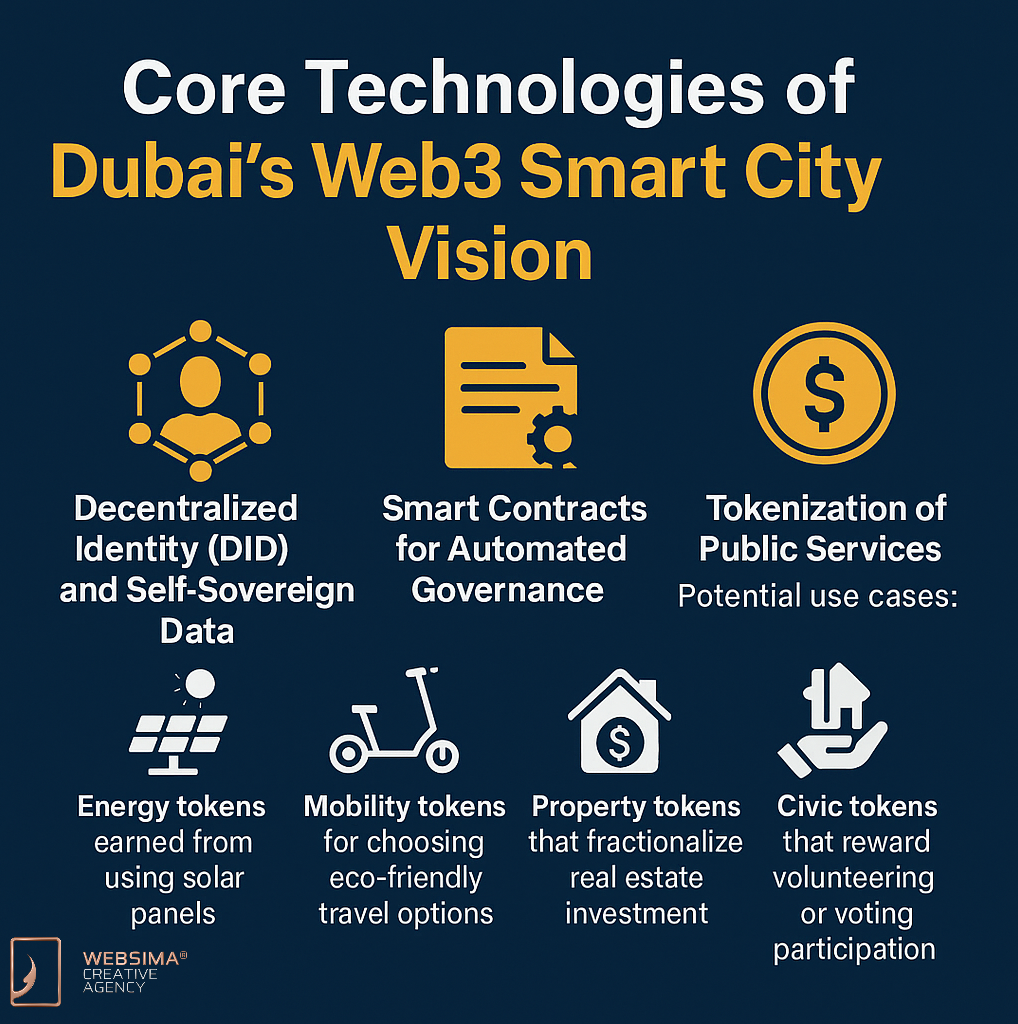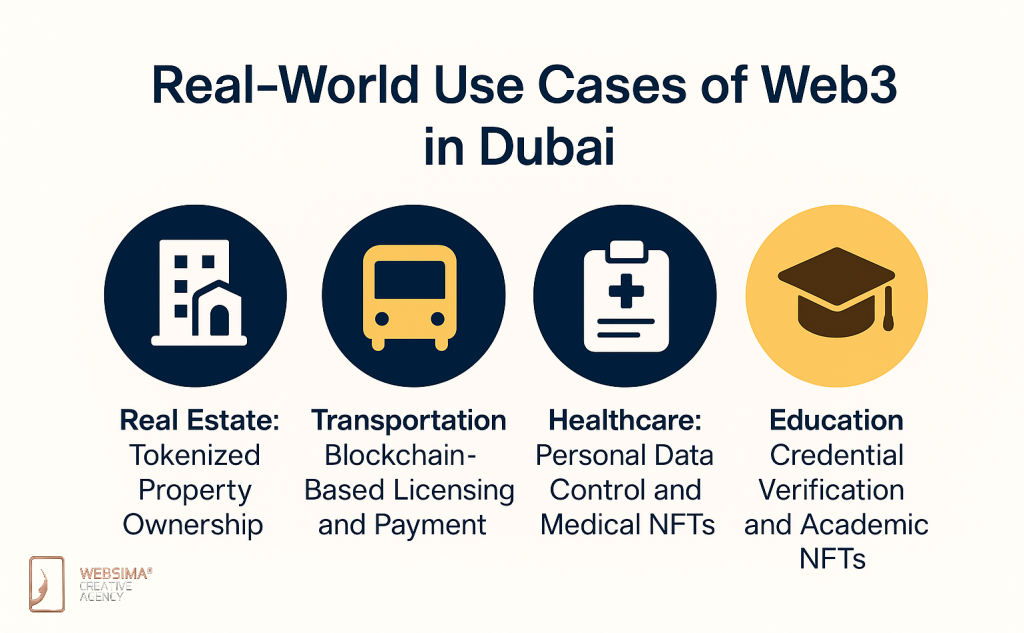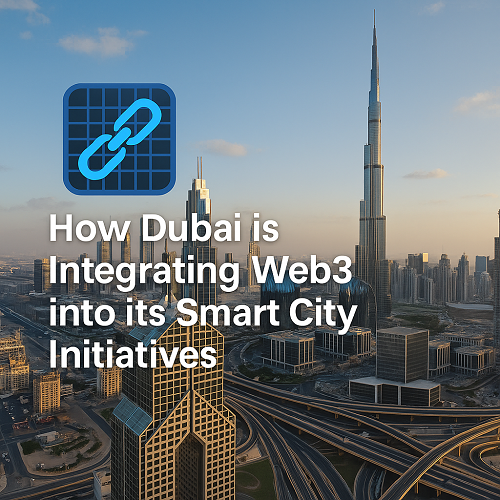Dubai is not just building taller skyscrapers—it’s designing smarter societies. As one of the world’s most ambitious metropolises, the city is rapidly transforming into a digital-first urban center with Web3 technology at its core. The movement toward a Web3 smart city Dubai represents a major evolution in urban governance, economic infrastructure, and public services.
By incorporating decentralized identity (DID), blockchain infrastructure, tokenized assets, and smart contracts, Dubai is redefining how cities operate. This transformation is more than just technological—it’s philosophical. Web3 offers transparency, security, and ownership, aligning perfectly with Dubai’s vision to create a people-centric, tech-powered urban environment.
The Foundation: Dubai’s Smart City Ambitions
Today, I visited Google’s Dubai offices, where I explored their latest artificial intelligence initiatives. We take pride in our longstanding partnerships with global technology leaders who have chosen Dubai as their regional hub. We remain committed to strengthening these… pic.twitter.com/wqBcDDbp35
— Hamdan bin Mohammed (@HamdanMohammed) May 12, 2025
From E-Government to Web3 Governance
Dubai’s smart city journey began with traditional digital services—migrating government operations online, streamlining bureaucracy, and reducing paper waste. Initiatives such as the Dubai Paperless Strategy have eliminated more than 1 billion paper documents annually. Yet, the shift from Web2 to Web3 represents something even more transformative: giving power back to the user.
In a Web3 smart city, data sovereignty is paramount. Residents don’t just use services—they co-own, co-create, and help govern them via decentralized technologies. The city transitions from a service provider to an interoperable platform supporting token economies, verifiable data, and autonomous systems.
Strategic Alignment with Web3
Dubai has made its stance clear: Web3 is integral to its future. Through initiatives like the Dubai Blockchain Strategy, the city aims to position itself as the first government to operate 100% on blockchain for all applicable services. This aligns with UAE’s broader strategy to be a global capital for blockchain, metaverse innovation, and AI.
Core Technologies of Dubai’s Web3 Smart City Vision

Decentralized Identity (DID) and Self-Sovereign Data
At the core of Dubai’s Web3 framework is decentralized identity. Unlike traditional ID systems managed by central databases, DIDs allow individuals to control their own credentials using blockchain-based wallets.
Through platforms like UAE PASS, which is evolving toward DID compliance, residents will be able to:
- Authenticate with zero-knowledge proof
- Store credentials securely without third-party access
- Selectively share only required information
- Avoid centralized data breaches
This means healthcare records, education certificates, and driving licenses can be verified instantly, without intermediaries. Hence, top Web3 startups disrupting industries in UAE and Dubai are emerging across many sectors.
Smart Contracts for Automated Governance
Dubai is pioneering the use of smart contracts—self-executing programs coded on the blockchain—to manage city functions. From leasing land to distributing permits, smart contracts reduce processing time, human error, and corruption.
Examples already in play include:
- Blockchain-based rental contracts under the Dubai Land Department
- Notary services via digital verification
- Automated customs clearance for imports and exports
- Upcoming smart contracts for trade licensing and taxation
Smart contracts enable transparency and accountability in public administration.
Tokenization of Public Services
Tokenization involves representing real-world assets or services as blockchain tokens. Dubai is moving toward a model where residents will be able to earn, trade, or spend tokens across city-wide systems.
Potential use cases:
- Energy tokens earned from using solar panels
- Mobility tokens for choosing eco-friendly travel options
- Property tokens that fractionalize real estate investment
- Civic tokens that reward volunteering or voting participation
This creates a decentralized incentive mechanism that supports sustainability and civic engagement.
Real-World Use Cases of Web3 in Dubai

Real Estate: Tokenized Property Ownership
Dubai has already piloted real estate tokenization. Properties are being fractionalized into NFT-backed tokens that represent legal ownership shares. Buyers can now invest in prime real estate with as little as a few hundred dollars.
Smart contracts handle:
- Ownership validation
- Escrow arrangements
- Revenue distribution from rent or sale
- Automated compliance checks
This democratizes property investment and expands global access to Dubai’s real estate market.
Transportation: Blockchain-Based Licensing and Payment
The Dubai Roads and Transport Authority (RTA) is exploring a Web3 integration strategy where transportation data, ownership documents, and licensing are stored on blockchain. Future mobility initiatives could include:
- NFT-linked vehicle registration
- DID-based driver identity
- Token rewards for carpooling or using public transport
- Crypto payment integration into metro and taxi systems
Such systems promote sustainability, traceability, and lower administrative costs.
Healthcare: Personal Data Control and Medical NFTs
Dubai’s Department of Health is investigating blockchain health record platforms. Under this system, a resident could store their entire medical history as a personal NFT, with access controlled solely by the individual. Hospitals, insurers, and even international care providers could request access via verifiable smart contract permissions.
Use cases include:
- Instant claim processing
- Health passports for travel
- Secure pharmaceutical tracking
- Preventing duplicate diagnostics across clinics
This ensures privacy, efficiency, and interoperability across healthcare providers.
Education: Credential Verification and Academic NFTs
Web3 allows academic degrees, certifications, and training records to be issued as NFTs. Dubai-based institutions like Mohammed Bin Rashid University are already exploring blockchain diplomas.
Benefits include:
- Tamper-proof qualifications
- Instant employer verification
- Global recognition of Dubai education credentials
- Automated student portfolios for job platforms and visa processing
This makes the city a global talent magnet and simplifies migration processes.
Community-Centered Governance: The Rise of Urban DAOs
DAO-Powered Urban Management
A Decentralized Autonomous Organization (DAO) is a blockchain-based entity governed by smart contracts and token holders. Dubai is evaluating how DAOs can be integrated into city governance models to:
- Allow citizens to vote on local policies
- Manage smart building operations
- Oversee budget allocation in digital communities
- Launch public improvement proposals via token staking
DAOs shift governance from a hierarchical structure to a collaborative, participatory model.
The Role of Tokenized Voting and Civic Engagement
In a Web3 smart city Dubai, digital participation can be gamified and incentivized. A citizen might earn civic tokens for:
- Participating in budget discussions
- Reporting urban issues via smart contracts
- Voting in local digital referendums
- Attending workshops and smart city summits
These tokens could be exchanged for subsidized utilities, transport discounts, or education credits—creating a feedback loop of engagement and reward.
Challenges and Barriers to Web3 Smart City Adoption
Legal Infrastructure and Compliance
Despite Dubai’s pioneering stance, full Web3 integration faces several hurdles:
- Defining legal recognition of DAOs
- Clarifying the taxation of crypto assets and tokens
- Ensuring NFT-backed property is enforceable under UAE law
- Harmonizing local law with global regulatory standards
Agencies like VARA and DIFC are crafting frameworks, but rapid innovation will require equally rapid legal agility. The legal process of registering a Web3 startup in Dubai becomes easier than before as the government’s goal is to make things easier for Web3 entrepreneurs.
Education and Digital Literacy
Adoption relies on public understanding. Most residents still struggle with:
- Private key management
- Wallet usage
- Recognizing phishing and smart contract risks
- Navigating tokenomics in city systems
Dubai will need large-scale education campaigns, simplified onboarding, and perhaps custodial solutions to bridge the user experience gap.
Technical Infrastructure and Scalability
Web3 systems demand robust internet, storage, consensus layers, and cybersecurity protocols. Dubai must continue investing in:
- Edge computing for smart buildings
- Quantum-safe encryption for citizen IDs
- Layer 2 scaling solutions like Polygon and Arbitrum
- Decentralized storage via IPFS or Filecoin
Redundancy, privacy, and uptime are crucial in a city where Web3 will power mission-critical systems.
Private Sector Partnerships Driving Web3 Integration
Dubai’s Web3 ecosystem is thriving due to deep public-private collaboration. Key players include:
- DMCC Crypto Centre – Hosting over 600 crypto firms
- Dubai Future Foundation – Accelerating Web3 urban pilots
- Emirates Blockchain Centre – Leading research and infrastructure development
- Startups like TMRW, Verofax, and ArabianChain
Together, they’re delivering prototypes in logistics, ESG reporting, building automation, and tokenized tourism.
Learn more about Dubai Future Foundation
The Future of Web3 Smart Cities: Dubai in 2035
By 2035, Dubai may achieve the following milestones:
- A universal decentralized ID replacing Emirates ID
- Real-time programmable public spaces governed by DAOs
- Fully NFT-tokenized land registry with embedded zoning rights
- On-chain GDP measurement based on token movement
- Entire neighborhoods that operate as tokenized digital communities
- AI-Web3 convergence managing smart grids and traffic flows autonomously
Dubai will become not just a smart city—but a sovereign digital entity with programmable institutions, autonomous economic zones, resident-owned urban systems and also an easy legal process of registering a Web3 startup in Dubai.
Conclusion
Dubai is setting the benchmark for how future cities can embrace decentralization, transparency, and user empowerment. The shift toward a Web3 smart city Dubai is not just an upgrade—it’s a complete transformation in how cities think, operate, and serve.
Through blockchain, token economies, smart contracts, and decentralized identity, Dubai is making urban life more efficient, inclusive, and secure. While challenges exist in regulation, literacy, and infrastructure, the city’s bold leadership and strategic investment ensure that the future of urban living is already under construction—on the blockchain.
Build the Future of Web3 Cities with Websima
At Websima, we build secure, scalable, and regulation-ready Web3 solutions tailored to city-scale transformation.
Our smart city services include:
- Blockchain infrastructure for real estate, health, and transport
- Smart contract systems for government automation
- NFT tokenization for property, credentials, and access
- DAO deployment for citizen governance
- Web3 UI/UX optimized for mass onboarding
- Legal compliance structuring aligned with UAE policies
Whether you’re a government agency, property developer, or civic tech innovator, we help you co-create the digital city of tomorrow.
Get in touch with Websima and let’s build the Web3 foundation for Dubai’s smartest future.





